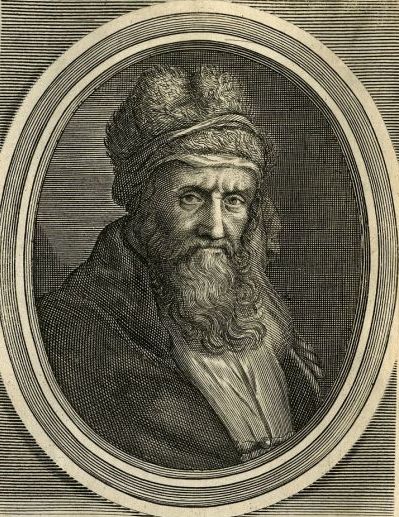Źródło: Żywoty i poglądy słynnych filozofów
Diogenes Laertios cytaty
Diogenes Laertios: Cytaty po angielsku
Aristippus, 4.
The Lives and Opinions of Eminent Philosophers (c. 200 A.D.), Book 2: Socrates, his predecessors and followers
“They say that the first inclination which an animal has is to protect itself.”
Zeno, 52.
The Lives and Opinions of Eminent Philosophers (c. 200 A.D.), Book 7: The Stoics
“Protagoras asserted that there were two sides to every question, exactly opposite to each other.”
Protagoras, 3.
The Lives and Opinions of Eminent Philosophers (c. 200 A.D.), Book 9: Uncategorized philosophers and Skeptics
“Pittacus said that half was more than the whole.”
Pittacus, 2.
The Lives and Opinions of Eminent Philosophers (c. 200 A.D.), Book 1: The Seven Sages
Socrates, 10.
The Lives and Opinions of Eminent Philosophers (c. 200 A.D.), Book 2: Socrates, his predecessors and followers
Theophrastus, 10.
The Lives and Opinions of Eminent Philosophers (c. 200 A.D.), Book 5: The Peripatetics
“Old age is the harbor of all ills.”
Bion, 47.
The Lives and Opinions of Eminent Philosophers (c. 200 A.D.), Book 4: The Academy
Thales, 9.
The Lives and Opinions of Eminent Philosophers (c. 200 A.D.), Book 1: The Seven Sages
Zeno, 74.
The Lives and Opinions of Eminent Philosophers (c. 200 A.D.), Book 7: The Stoics
“When asked what learning was the most necessary, he said, "Not to unlearn what you have learned."”
Antisthenes, 4.
The Lives and Opinions of Eminent Philosophers (c. 200 A.D.), Book 6: The Cynics
Aristotle, 9.
The Lives and Opinions of Eminent Philosophers (c. 200 A.D.), Book 5: The Peripatetics
“Diogenes lighted a candle in the daytime, and went round saying, "I am looking for a man."”
Diogenes, 6.
The Lives and Opinions of Eminent Philosophers (c. 200 A.D.), Book 6: The Cynics
Diogenes, 6.
The Lives and Opinions of Eminent Philosophers (c. 200 A.D.), Book 6: The Cynics
Plato, 51.
The Lives and Opinions of Eminent Philosophers (c. 200 A.D.), Book 3: Plato
Thales, 8.
The Lives and Opinions of Eminent Philosophers (c. 200 A.D.), Book 1: The Seven Sages
“It was a saying of his that education was an ornament in prosperity and a refuge in adversity.”
Aristotle, 9.
The Lives and Opinions of Eminent Philosophers (c. 200 A.D.), Book 5: The Peripatetics
“Aristippus said that a wise man’s country was the world.”
Aristippus, 13.
The Lives and Opinions of Eminent Philosophers (c. 200 A.D.), Book 2: Socrates, his predecessors and followers
